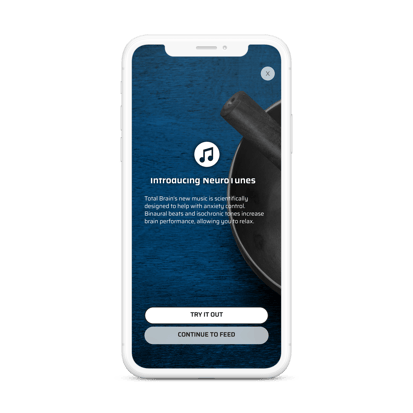By Andy Markham on Thu, Sep 10, 2020
What type of music do you enjoy listening to when you are happy? Is there a go-to song that you listen to when you’re sad? We often gravitate toward certain types of music based on our mood. But, what you may not have considered is that you can actually control your mindset and feelings with music.
If you’ve ever noticed that your mood changes after listening to music, you know how powerful music truly is. Music can be a source of entertainment or comfort. It can also have a profound effect on your brain and your feelings. This isn’t just a sense or something you imagined, science shows that different types of music impact us differently.
Consider these research findings published in a study about the effects of music on relaxation:
- Certain music has the capacity to lower heart rate, slow breathing and decrease levels of the stress hormone ‘cortisol’ in the blood.
- Brain imaging studies have shown that music works at a very deep level within the brain, stimulating not only those regions responsible for processing sound, but also ones associated with emotions.
- One of the reasons behind the relaxing qualities of certain pieces of music is that they stimulate production of the ‘feel-good’ chemical dopamine.
At Total Brain, we’ve studied the neuroscience behind music’s impact on feelings extensively. In particular, we’ve explored how music can help relieve anxiety and aid in relaxation. Recently, we took what we know about music and relaxation, and we worked in collaboration with John Vitale — one of the music industry’s most sought-after composers and producers — to develop a new tool that uses sound and music to reduce anxiety. It’s called NeuroTunes.

A Calming Listening Experience
NeuroTunes is a collection of scientifically composed music and soundscapes designed to reduce anxiety in the moment and instill calmness in listeners.
There are now 15 NeuroTunes tracks available as part of the Total Brain app. These new musical tracks and soundscapes offer listeners a variety of choices that can help alleviate anxiety.
Listen to a few snippets of select tracks here:
How does NeuroTunes Work?
NeuroTunes stimulates the brain through entrainment. That means the sound from the NeuroTunes tracks alters brainwaves to drive a desired calm mood state. Tempo is a key part of the neurostimulation. NeuroTunes tracks are designed not only to have an optimal tempo for inducing calm, but the tracks have built-in tempo changes that work to nudge listeners into a progressively calmer state as they listen.
In addition to tempo, NeuroTunes allows listeners to add binaural beats and isochronic tones to guide their minds to an even more relaxed state. This is another way to move brain frequency to the level most conducive to relaxation. Users control binaural beats and isochronic tone levels with a slider, so they can easily be increased or decreased at any point during listening.
.png?width=413&name=neurotunes%20(1).png)
Some of the tracks—for example, the nature sounds — were recorded in 3D. This results in a more vivid sense in the listener of proximity and placement, which in turn promotes a deeper sense of immersion and a stronger overall effect.
When is listening to NeuroTunes tracks beneficial?
Whether you are already feeling anxious and looking for relief in the moment, or you simply want to deepen your already relaxed mindset as you prepare to take on your day or wind down for the night, listening to NeuroTunes will help you achieve a greater sense of calm. Here are three examples of times when you may find listening to NeuroTunes beneficial during your day:
- During your morning routine – Some people are “morning people” by nature. Others aren’t. Let’s face it, either way, mornings can be hard. We feel groggy in the morning. We may turn to caffeine in the morning as a stimulant to jolt us awake and help us take on the day ahead. We might feel anxious about the emails waiting in our inbox or the challenges that we expect to pop up during the day. We may need to get children dressed, fed, and transported to where they need to be. All of these factors can make it difficult to keep calm and face the day with the optimism we want to have. Listening to NeuroTunes in the morning can make it easier to start your day in a more calm and relaxed state. Playing a track while you eat breakfast, or listening during a morning commute, can help bring some balance to your morning and prepare you for whatever comes next.
- When anxiety creeps up at work or school – The pressure of a looming deadline or an important upcoming exam can trigger anxiety and make it harder to concentrate and prepare properly. If you are a person who enjoys listening to background music while working or studying, NeuroTunes is a good choice. The tracks don’t have lyrics to distract you, and they are composed to help you achieve a calm and relaxed state. By relieving anxiety, you can improve your productivity in order to attain better results.
- To relax in the evening – Many people enjoy listening to music before bed or even as they fall asleep. Depending on the type of music you choose, your mind can either be triggered to become more anxious or relaxed. Listening to NeuroTunes before going to sleep will put your brain in a relaxed state. Ultimately, this can help improve your sleep — something that is important for your mental and physical health.
These are only a few examples of the ways NeuroTunes can be incorporated into daily routines. The tool is incredibly versatile because it simply involves listening — something that can be done at many different times, in many different ways.
Total Brain users can begin using NeuroTunes and find their favorite tracks now in our Total Brain app.




comments